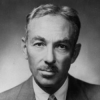E. B. White

E. B. White
Elwyn Brooks "E. B." White was an American writer. He was a contributor to The New Yorker magazine and a co-author of the English language style guide The Elements of Style, which is commonly known as "Strunk & White". He also wrote books for children, including Stuart Little, Charlotte's Web, and The Trumpet of the Swan. Charlotte's Web was voted the top children's novel in a 2012 survey of School Library Journal readers, an accomplishment repeated in earlier surveys...
NationalityAmerican
ProfessionWriter
Date of Birth11 July 1899
CountryUnited States of America
The world organization debates disarmament in one room and, in the next room, moves the knights and pawns that make national arms imperative.
The terror of the atom age is not the violence of the new power but the speed of man's adjustment to it, the speed of his acceptance.
Humor is like a frog. You can dissect it to see how it works, but by then, it's dead.
Television should be our Lyceum, our Chautauqua, our Minsky's and our Camelot.
Commas in The New Yorker fall with the precision of knives in a circus act, outlining the victim.
To perceive Christmas through its wrappings becomes more difficult with every year.
I can only assume that your editorial writer tripped over the First Amendment and thought it was the office cat.
The trouble with the profit system has always been that it was highly unprofitable to most people.
There's no limit to how complicated things can get, on account of one thing always leading to another.
It is easier for a man to be loyal to his club than to his planet; the bylaws are shorter, and he is personally acquainted with the other members.
The critic leaves at curtain fall To find, in starting to review it, He scarcely saw the play at all For starting to review it.
There is simply a better chance of doing well if the writer holds a steady course, enters the stream of English quietly, and does not thrash about.
Books are the door of escape from the forest.
Liberals are like dogs: The liberal holds that he is true to the republic when he is true to himself. (It may not be as cozy an attitude as it sounds.) He greets with enthusiasm the fact of the journey, as a dog greets a man's invitation to take a walk. And he acts in the dog's way too, swinging wide, racing ahead, doubling back, covering many miles of territory that the man never traverses, all in the spirit of inquiry and the zest for truth. He leaves a crazy trail, but he ranges far beyond the genteel old party he walks with and he is usually in a better position to discover a skunk.